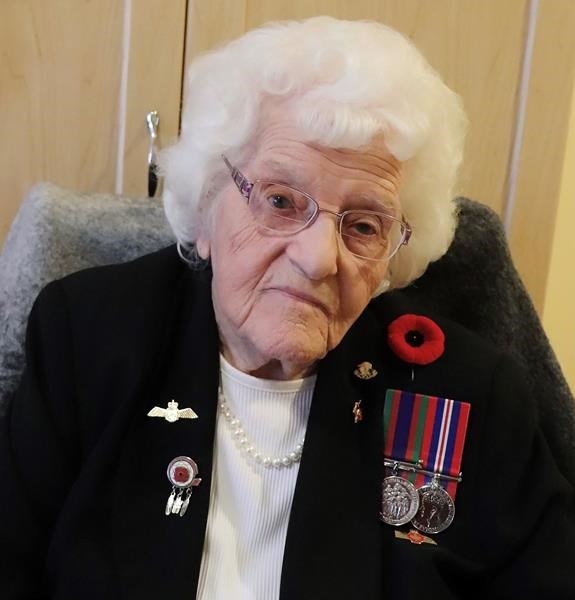HALIFAX — The pride in Blanche Bennett’s voice was evident as she vividly recounted the day 80 years ago when she volunteered to serve in the Canadian Women’s Army Corps.
Bennett, who turns 100 on Nov. 12, was just 19 when she signed up in 1942 to become one of the nearly 46,000 women who served their country in the military during the Second World War. She said in a recent interview that she immediately went home and informed her surprised mother of her plan.
“She said, ‘Well, you’re not going,’ and I said, ‘Of course I’m going,’” Bennett recalled. “She said, ‘You can’t, they don’t have women in the army,’ and I said, ‘They do now. They got me.’”
Bennett, a native of Summerside, P.E.I., who now lives in a Charlottetown long-term care home, is one of about 120 veterans and family members who have been interviewed as part of an ongoing oral history project by the Canadian War Museum. The project is taking a unique approach by focusing not on wartime experiences but on what followed.
Michael Petrou, the research project’s lead historian, believes In Their Own Voices will fill a gap in war historiography by highlighting the positive and negative effects on veterans and their families as they moved on with their lives.
“The military service doesn’t end when it officially ends. It continues to influence the lives of veterans afterwards,” said Petrou. “People forget the massive social change that military service and conflict has.”
Bennett said her pride in serving influenced her life following the war, and that is one of the reasons why she participated in the project.
“To be really honest, I think it’s great when people ask me to talk about the war, because for a long time after the war there were an awful lot of people who didn’t even know that women served,” she said.
Bennett was a member of a signals squadron and served as a telephone operator in Halifax until the war ended. She met and married her husband Murray during that time and went on to raise a family of three daughters as her husband embarked on a postwar career in the Royal Canadian Air Force.
“I don’t think I ever became a civilian, because after the war I was back in it again,” she said with a warm laugh.
In their retirement years, the couple were active in Remembrance Week activities and often gave talks in Island schools. Bennett said the recognition she and other women have since received is gratifying if late in coming.
“Things did change,” she said. “People began to notice that we were somebody and had done something. To me, it was the highlight of my whole life.”
By contrast, Toronto-area author Jonathon Reid’s experience as the son of a Second World War veteran who was captured after the downfall of Hong Kong is largely one of pain, bewilderment and loss.
The 74-year-old said he decided to be interviewed by Petrou because of his own journey in trying to understand his father, John Reid, who died in 1979 at the age of 65.
“I grew up with the results of his war experience, which were a broken family, a lack of a father most of the time and a very sad mother,” said Reid. “I realized that this project … was really a more public version of what I had been trying to do on a personal level.”
Reid recounted his father’s service as an army doctor and his family’s postwar experience in a 2020 book, “The Captain Was a Doctor.” The book details how John Reid led his men heroically through nearly four years of captivity, which included more than two years of forced labour in Japan.
Back home after the war, he and his wife started a family, but Reid said his father was distant and refused to talk about his experiences. Eventually, he abandoned his family.
He said despite the trauma that caused, both he and his brother strove to lead happy and productive lives.
“There is a resounding impact that goes down at least one generation and I would think two,” Reid said. “You have to accept it and go on. Just realize that your job then is to understand as best you can, but get up and keep going.”
Petrou said stories such as Bennett’s and Reid’s are the essence of what the project is trying to achieve.
“We want veterans to show themselves in all their complexities, their flaws and their successes too,” he said.
Petrou said he hopes to do as many as 200 more interviews, with an online video exhibition planned for 2025 as well as a book and an academic conference. There are also plans to provide educational materials for schools.
“My hope and my suspicion is that these interviews will echo in the museum in ways we don’t quite know yet for many years,” Petrou said.
This report by The Canadian Press was first published Nov. 3, 2022.
Keith Doucette, The Canadian Press
Related






























